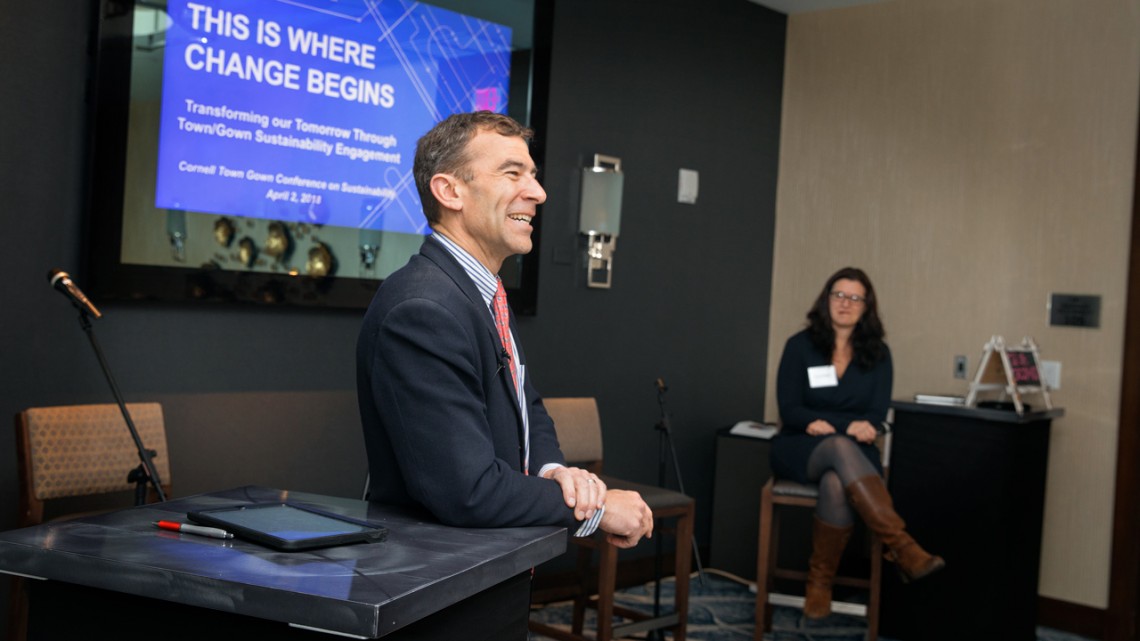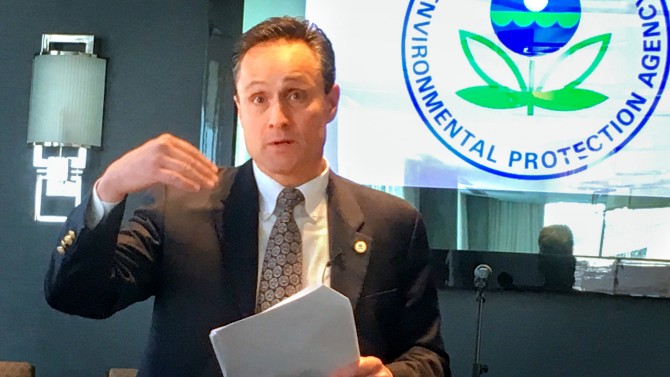
Ryan McPherson, front, and Julie Barrett O'Neill explain Buffalo's One Region Forward plan at Cornell's Town-Gown Conference on Sustainability April 2.
Town-gown efforts smooth bumpy road to sustainability
By Blaine Friedlander
Pete Lopez, the U.S. Environmental Protection Agency’s (EPA) regional administrator, confirmed at Cornell’s 2018 Town-Gown Conference on Sustainability that community relations – even at the federal level – can be a bumpy road as parties work to serve a town’s best interests.
Lopez – a former New York State Assembly member – spoke about the EPA’s Quanta Resources Superfund site in Edgewater, New Jersey, a century-old remediation site along the Hudson River, just south of the George Washington Bridge. The site is rife with noxious, cancer-causing chemicals. “[Residents] are proximate to large development. There are homes and business parks and shopping and retail outlets in and around this Superfund site,” said Lopez.
It’s a challenge is to trying to constrain development during site mitigation, he explained: “As you can imagine, residents are concerned about [toxic chemicals] in their homes, [toxic chemicals] on the playgrounds, and so part of the challenge has been to get people to understand the risks. How do we manage it and how do we mitigate those issues?”
As the region’s administrator, Lopez said he wants communities to grow and prosper. “We want to make sure that our waters are clean. We want to make sure our air remains clean. The challenge is how do we address this?” he said. “From my standpoint, sustainability has many faces. We talk about environmental sustainability, agricultural sustainability, community sustainability and economic sustainability. I will would submit that all of these are not mutually exclusive.”
Julie Barrett O’Neill, general counsel for the Buffalo Sewer Authority, and Ryan McPherson, chief sustainability officer for the University at Buffalo, spoke on a clean energy vision in “Transforming Our Tomorrow.” They described how building coalitions among local higher education institutions, businesses and organizations through One Region Forward enhanced climate change mitigation efforts and improved the economic climate. “Now, we are moving the needle,” said McPherson.
David Kay, of Cornell’s Community and Regional Development Institute, provided illustrations of town-gown quandaries in land-use controversies. Beth McGee, Enfield, New York, town supervisor; Jason Leifer, Dryden, New York, town supervisor; and Sarah Zemanick, director of Cornell Sustainability, provided insight on the discontinued Black Oak wind farm proposal in Enfield and the solar farm development in Dryden.
Roxy Johnston, City of Ithaca Watershed coordinator; consultant Liz Moran; and Lanny Joyce, Cornell director of utilities and energy management, talked about the university’s Lake Source Cooling project and how that environmental initiative began 25 years ago, fraught with campus-community challenges.
Alex French, Clarkson University’s sustainability coordinator, and Maggie McKenna, a trustee of the Village of Potsdam, New York, described how Clarkson and the town registered for the New York State Department of Environmental Conservation’s Climate Smart Communities program, created a comprehensive sustainability plan, implemented composting, created an annual class project for Clarkson honor students, and developed details on a hydropower purchase agreement.
Also at the meeting, the 2018 Cornell University Partners in Sustainability Award was presented to Fernando de Aragon of Ithaca Carshare and Hector Chang of Bike Walk Tompkins.
The conference was organized by Community Relations in Cornell’s Division of University Relations.
Media Contact
Get Cornell news delivered right to your inbox.
Subscribe

